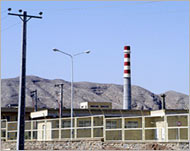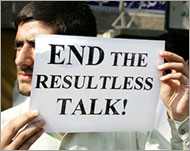Diplomat: Iran to restart nuclear work
Iran has said it will restart uranium conversion activities but has given UN inspectors access to a secret military complex.

Iran on Wednesday granted UN nuclear inspectors access to a high-security military site as part of efforts to avoid referral to the Security Council, the atomic watchdog says.
However, Tehran has also told the IAEA that it will soon resume converting uranium into a gas that can be enriched either to generate energy or produce nuclear weapons, a diplomat close to the agency said.
Together, the developments showed Iran was unwilling to meet international calls to give up enrichment and all linked activities, but at the same time wanted to cast itself as conciliatory and ready to cooperate with IAEA inspectors investigating its past nuclear activities.
The 35-nation IAEA board at its September meeting told Iran to suspend all activities related to uranium enrichment, including conversion, and to give agency experts access to research, experts, locations and documents or be referred to the Security Council. Iran has not gone beyond conversion, but insists it has the right to advance to the next stage – enrichment.
“The next (enrichment) campaign will start” within weeks, said the Iranian announcement posted on the IAEA’s internal web site.
Western suspicion
The US and other nations have linked a military complex in Parchin to alleged nuclear arms-related experiments. The IAEA had been trying for months to follow up a January visit to conduct further checks within the sprawling complex for traces of radioactivity.
 |
|
Iran is accused of secretly |
The January visit – which was closely controlled by authorities – revealed no such traces.
An IAEA spokesperson, who asked not to be named, confirmed “IAEA inspectors obtained access to buildings at the Parchin site”.
Iran also has given IAEA inspectors new sensitive documents and granted interviews with several senior officials thought linked to black market purchases of uranium enrichment technology, the official said.
At issue is how much centrifuge-related technology Iran obtained on the black market starting in the 1980s and the location of that equipment.
There are suspicions that part of that technology has not been declared to the IAEA and that the military is using it for weapons-related experiments.
Purge
Also on Wednesday, Iran’s government announced the removal 40 ambassadors and senior diplomats as part of a wide-scale purge to keep reformists out of key security ministries.
The purges are the biggest shake-up of Iran’s government in more than two decades and effectively change the state’s policy directions on the international stage and at home.
The moves give President Mahmoud Ahmadinejad’s new government the chance to remove pro-reform and liberal-minded figures appointed by the last president, moderate Mohammad Khatami, and install its own supporters.
Foreign Minister Manouchehr Mottaki announced the changes to parliament on Wednesday, saying, “The missions of more than 40 ambassadors and heads of Iranian diplomatic missions abroad will expire by the end of the year”, which is 20 March under the Iranian calendar.
 |
|
Hardliners want Tehran to pull |
Ahmadinejad has taken a tougher line on a series of issues, particularly in negotiations with Britain, France and Germany over Iran’s nuclear programme.
Hard-liners have criticized Khatami’s government for agreeing to freeze much of Iran’s nuclear activities during the talks, and Ahmadinejad has already replaced much of the negotiating team with hard-liners.
Mottaki, quoted by the state-run Islamic Republic News Agency, did not specify which ambassadors were among those being removed.
But IRNA said they include Iran’s ambassador to London, Mohammad Hossein Adeli, one of Iran’s top diplomats who was considered a leading member of the pragmatic foreign policy wing that supports contacts with Europe and other countries.
Iranian Foreign Ministry officials, speaking on condition of anonymity because they were unauthorised to speak to the media, said the ambassadors to France, Sadeq Kharrazi; Germany, Shamsoddin Khareqani; and Malaysia, Amir Hossein
Zamaninia, were on their way out.
Iran’s top security decision-making body, the Supreme National Security Council, has also been caught up in the purge. The council leads Iran’s nuclear negotiations with the international community.
Mohammad Jafari, a former commander of the elite Revolutionary Guards, is among several new faces at the council.